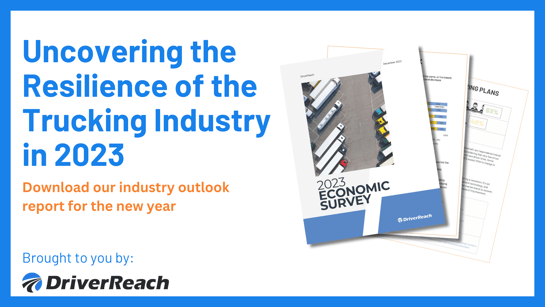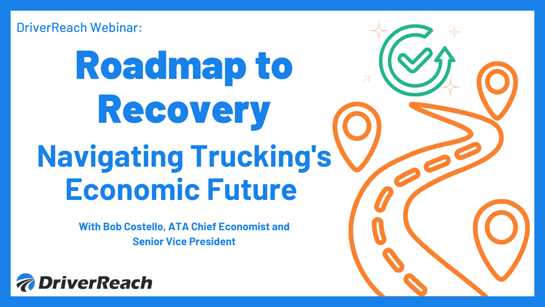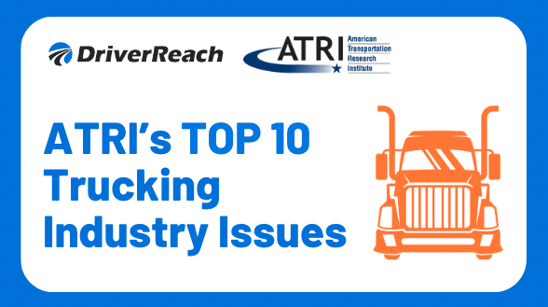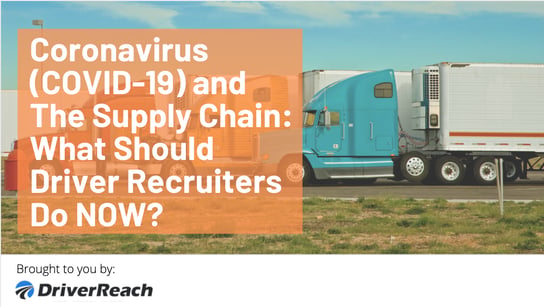The webinar "Trucking's Top 10" by Jeremy Reymer of Driver Reach gave important information about the trucking industry. Rebecca Brewster, President and COO of ATRI, discussed important industry issues in the webinar based on their latest report. To watch the on-demand webinar, click HERE.
Economic Concerns and Truck Parking Shortages
In 2023, the state of the economy is not just a buzzword but a critical concern impacting the trucking industry at its core. Brewster emphasized how economic fluctuations resonate throughout the sector, affecting everything from freight rates to operational costs. Picture a huge domino game where one piece - the economy - can cause a series of events that affect the entire industry.
But there's another, often overlooked challenge that’s just as pressing – truck parking shortages. This isn't just about finding a spot to park; it's a matter of safety and logistics that affects drivers daily.
Imagine driving for hours, fatigued and needing rest, only to find every parking spot taken. This problem goes beyond just being inconvenient.
This problem is more than just inconvenient. It is important to ensure that drivers have a safe and easy place to rest. This is crucial for their health and the efficiency of the transportation system. Brewster highlighted that without addressing this, we risk not only the health and safety of drivers but also the smooth operation of the logistics that keep our economy running.
Rising Fuel Prices and Driver Shortages
Picture this: every time you fill up your truck, the price has crept up just a little more. That's the reality for the trucking industry with the relentless rise in fuel prices.
Like a constant uphill battle, each incline represents an increase in fuel costs per mile. These costs don't just nibble at the edges of profit margins; they take big bites. For an industry that literally runs on fuel, this is a significant strain, one that doesn't show signs of easing anytime soon.
Then there's the issue of driver shortages, which looms like a storm cloud over the industry. Brewster pointed out a crucial factor contributing to this: the aging driver workforce. It's like having a seasoned team with years of experience but very few rookies coming up the ranks.
The challenge? Attracting younger drivers to the field.
The purpose is not only to fill seats but also to bring in new energy and perspectives. This helps to keep the industry vibrant and moving forward. Brewster emphasized that solving this puzzle is more than a mere recruitment drive; it's about shaping the future of trucking and ensuring its sustainability in the years to come.
The Impact of Congestion and Legal Concerns
The webinar shed light on the cost of congestion to the trucking industry, highlighting billions of dollars lost and significant hours of delay. Legal issues, particularly regarding lawsuit abuse reform and insurance costs, were also discussed, underlining their impact on operational costs.
Driver Compensation and Marijuana Legalization
In the ever-evolving trucking landscape, driver compensation has emerged as a pivotal factor in addressing the driver shortage crisis. Think of it as a balancing act, where increasing compensation serves as a lever to attract and retain talent in an industry grappling with a dwindling workforce. Brewster emphasized the need to value and reward drivers for their important role in the economy, not just filling seats.
On another front, the trucking industry faces a complex challenge with the growing legalization of marijuana, particularly in states where recreational use is legal. This shift presents a unique set of implications for driver workforce and road safety.
It's like navigating a road with constantly changing signposts. The industry must adapt to these changes, balancing legal compliance, safety concerns, and the realities of a changing legal landscape. Brewster underscored the importance of staying ahead of these developments, ensuring that safety and legal compliance remain at the forefront of industry practices.
Transition to Zero-Emission Vehicles
The transition to zero-emission vehicles is not just a trend but a pivotal shift in the trucking industry’s journey toward sustainability. Brewster compared this transition to a long race that needs stamina, planning, and a lot of money. The challenge lies in building an infrastructure that can support this new era of trucking - from extensive charging stations to addressing the strain on the electric grid. It's akin to constructing a new highway while still driving on the old one.
This change is not just about replacing engines; it's a complete transformation of how the trucking industry works with the environment. Brewster emphasized the importance of planning and investing in infrastructure. This is necessary to transition to zero-emission vehicles. It will also improve efficiency and environmental responsibility in the industry.
Safety Technologies and Female Driver Recruitment
In the realm of trucking, safety technologies are not just add-ons but essential tools that redefine road safety. Brewster highlighted the role of road-facing cameras, which have become a game-changer in monitoring and improving driving practices. Think of these cameras as vigilant co-pilots, providing an extra layer of safety and accountability on the road.
Furthermore, the recruitment of female drivers stands as an untapped potential in the industry. Brewster found that women have fewer accidents than men, suggesting the need for more inclusive hiring methods. Adding diversity to the drivers is like planting seeds in fresh soil introducing new viewpoints, abilities, and methods to the field. This push for increased female driver recruitment isn’t just about filling a quota; it’s a strategic move towards a safer, more diverse, and dynamic workforce in trucking.
Government Policies and Industry Response
Throughout the webinar, the role of government policies in shaping industry practices was evident. From hours of service regulations to environmental mandates, the interplay between legislation and trucking operations was a recurring theme. Brewster advocated for more industry input in policymaking processes.
ATRI’s Role and Research Contributions
ATRI’s role as a research institution was underscored, with Brewster detailing various studies and reports produced by ATRI. She encouraged industry stakeholders to leverage these resources for better decision-making and policy advocacy.
Community Involvement and Support
The webinar concluded with a call for community involvement and support for ATRI’s research initiatives. Brewster emphasized the importance of charitable contributions in enabling ATRI to continue its valuable work for the industry.
Looking Forward
As we wrapped up the enlightening "Trucking’s Top 10" webinar, it was clear that the journey ahead for the trucking industry is both challenging and ripe with opportunities. The sector faces many uncertainties, such as economic conditions, regulatory changes, and technological advancements.
In this dynamic landscape, forums like the "Trucking’s Top 10" webinar are not just informational gatherings but beacons of knowledge, guiding the industry through turbulent times. These discussions are invaluable in fostering a collective understanding, sparking innovative ideas, and unraveling complex issues. They serve as a platform where industry experts, veterans, and newcomers alike can converge to share their experiences, insights, and visions for the future.
As we look forward to what lies ahead, it’s imperative to recognize the importance of resilience and adaptability. The trucking industry is not just about moving goods; it’s about connecting lives, powering economies, and driving progress. The road ahead demands a more efficient, sustainable, and inclusive approach to trucking, one that embraces change and harnesses the power of collaboration and innovation.
For those who wish to dive deeper into the intricacies of these topics and understand trucking industry opportunities, ATRI’s extensive research offers a treasure trove of information. By visiting truckingresearch.org, you can access a wide array of studies and reports that provide detailed insights into every facet of the trucking industry. From driver compensation trends to the latest developments in zero-emission vehicles, ATRI’s research sheds light on the pressing issues and emerging trends that shape the industry.
Your engagement in these discussions and support for ongoing research is more than just a contribution; it’s an investment in the future of trucking. Whether you’re a seasoned professional or new to the industry, your perspective and participation are crucial in steering the trucking industry toward a more prosperous, sustainable, and innovative future.











